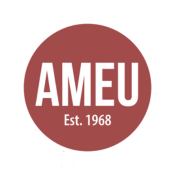Jews Step Forward – By Marjorie J. WrightWithin every film there’s a story beyond the narrative itself and the filmmaking process. There is a compulsion, a reason to devote the considerable resources necessary and seemingly endless hours over several years, to create that visual message. Nowhere is this more true than with the documentary and with this issue in particular.
For me, the genesis for Jews Step Forward traces back to 1988 with the beginning of the First Intifada and moves through a self-education regarding Jewish social justice and its current re-awakening within that community regarding Israel.
A large proportion of American Jews today trace their roots through Ellis Island and the Yiddish speaking working class wave from 1880 to the early 1920s. Landing in New York with few resources and in search of work, many became part of that hard fought struggle on behalf of organized labor, women’s suffrage and equal rights as a religious minority. That is a shared solidarity, which has survived, even as religious observance has thinned — a kind of cellular memory shaping Jewish political loyalties today.
Early Jewish organizers, like British immigrant Samuel Gompers, who in the 1880s championed craft unionism and founded the American Federation of Labor, which he led until 1924, wielded enormous influence.
The power of Jewish leadership created and sustained a force inside that organization and as a model for others. The Socialist Labor Party, United Hebrew Trades, the Yiddish socialist press, Russian Bundists, Amalgamated Clothing Workers, International Ladies Garment Workers Union and Emma Lazarus Clubs all had Jewish leadership and played a role in labor and social justice issues. The Socialist United Hebrew Trades, a Federation of Jewish unions, numbered some 250,000 members in 1913.
As Jews climbed the economic ladder, political engagement and educational levels increased inside the community, as did an expanding consciousness for social justice. The children and grandchildren of some of those Jewish immigrants did not abandon those roots and went on to be part of the “New Jewish Left” of the 1960s and ‘70s, the ”New Jewish Agenda” in the 1980s, as well as the Anti-Apartheid movement supporting indigenous South Africans, and the Feminist, Gay and Civil Rights Movements nationally.
This has dovetailed with reinterpretations of Jewish liturgy, to fuse with those activist causes. The concept of “Tikkun Olam” — do something that will repair the world — emerged from a prayer in the middle of the 20th century, to be the motto of a new generation’s self-understanding.
Shlomo Bardin advanced the idea that Tikkun Olam should move beyond a religious abstraction and into an active obligation “to work toward a more perfect world.” While later also assuming a role in Kabbalah, Tikkun Olam brought together the synagogue with secular branches of a new generation, joined in common cause.
Jewish social justice is not a modern concept however, but one with roots in communitarian medieval Jewish society, Judaism’s value-based foundation, and the life, work and influence of Eastern European Orthodox Rabbi Salanter.
In the 19th century, Rabbi Yisrael ben Ze’ev Wolf Lipkin (1809-1883), known as Rabbi Salanter, was the founder of a new movement termed Musar. The word Musar literally means instruction, discipline or conduct, but the Rabbi applied that concept to ethical development. Believing that ethical consciousness and actions were closely tied to spiritual enlightenment, ritual observance was empty without it. Musar thought was and is an important foundation for Jewish social justice, and its resurgence today has brought a new generation of secular Jews closer to their religious roots.
Originally, Zionist institutions mirrored in many ways the initiatives spearheaded by the Jewish labor movement in Europe and America. In the U.S., the Workman’s Circle network of services included health care programs, old age homes, schools, libraries, summer camps, sports teams, women’s clubs, reading circles, orchestras etc. It represented Jewish culture and values, but without religion. This was also the essence of Labor Zionism’s model at its outset.
As the communitarian kibbutz movement and the Israeli Labor Party have eroded with the rise of Israel’s hard Right, along with an increasingly violent military necessary to maintain the Occupation, Israel’s shared consciousness with American liberals has dwindled.
Today, a growing number of young Western Jews do not want to identify with Israel, irrespective of the notable cultural, academic, and intellectual achievements that Israel has developed. Their issue is really with Zionism, by definition exclusionary and supremacist. As Yosef Weitz of the Jewish National Fund wrote on 20 March 1941: “The complete evacuation of the country [Palestine] from its other inhabitants and handing it over to the Jewish people is the answer.”
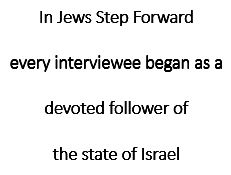
Today, what was termed solidarity has been expanded into political intersectionality, which recognizes Palestinians as indigenous peoples. Even Moment Magazine, co-founded by Elie Wiesel, in 2016 ran a cover story entitled: “How the Black Lives Matter and Palestinian Movements Converged.”Moment has conducted symposiums on topics which would have been untouchable before: “Can Religious Pluralism and an Official Rabbinate Coexist in Israel?”, “What Does it Mean to be Pro-Israel Today?”, and “Is There Such a Thing as the Jewish People”?
So, while official American Jewish organizations still support Israel without scrutiny, an increasing number of mainstream Jews just can’t go with the old story or current PR, for which Israel pays so exorbitantly every year to manage their image and ’brand.’
In Jews Step Forward, every interviewee began as a devoted follower of the state of Israel, investing their collective hope in the idea of European Jews rising from the ashes of genocide to create a safe haven and utopian society inside the Middle East.
It is almost impossible to overstate how deeply the Jewish community internationally wanted to believe collectively in this abstract construct and how difficult and painful it is for many to relinquish a beautiful myth and see clearly the reality of Israel today.
Each interviewee reflects upon his or her own journey from that deeply socialized ‘group think’ to a ‘eureka moment,’ where they were compelled to leave hasbara [Zionist propaganda] behind.
For some, it felt intensely painful and tragic, while others manifested anger and shame. For still others, it was a call to action, to shed hypocrisy and define Israel with the same standards of deep commitment to human rights, social, and political justice, which defined who they are as Jews. Dorothy Zellner said: ”I could not work to make sure that Black people in Mississippi had the right to vote and then turn around and be supportive of a state where every citizen does not have equal rights before the law…. We’re human beings, and we refuse to be stampeded by so-called group loyalty or blindness to Israel….It is not a privilege to fight to change our community. It is a moral imperative. “
Some experienced their ‘eureka moment’ in the late ‘40s, some during the 1967 Six Day War, others in the ‘70s or ‘80s, and with two writers as late as 2006. My own was in 1989, one year into the First Intifada.
Mixing interpretations of theology in both Jewish and Christian communities with a 19th-century ethnic nationalism that required colonialism to depopulate and repopulate its religio-political state, this marked the beginnings of Zionism. It was a strategy, whose presentation was carefully managed and presented in the West, but which ignored or concealed ethnic cleansing, advocacy for genocide, institutionalized theft of assets, homes and property, racism, repression, incarceration, torture and murder of the indigenous population.
The biblical term “Land of Israel” created cover to use any means necessary to drive Herzl’s “dream.” While a number of important Jewish intellectuals resisted the idea of Zionism at its outset, the Holocaust sealed Israel’s acceptance throughout the West, both among Jews and non-Jews. European governments had no desire to take back thousands of impoverished displaced survivors and many of those victims had no desire to return.
So, a perfect storm marked the first time, during the process of modern decolonization that a country was given, not to its indigenous inhabitants, but instead to an outside population. This kind of exceptionalism continues in Israel to the present day, exacerbated by codependent relationships with current corporate and political world powers, coupled with historic guilt.
My Journey
Regarding my own experience, I was raised a Christian Zionist and socialized much like Jewish children on the subject of Israel. It was all about ‘God’s chosen people in their land’ with ‘all those Arabs’ as ‘amalek.’ The words Israeli and Israelite were almost interchangeable terms, which is still true today across many Christian fundamentalist congregations.
One of the only films in a cinema that I was taken to see as a child was Exodus. As with most American school children, nothing about this subject is taught beyond the Holocaust. So, I coasted along in ignorance, despite going on to attend an Ivy school.
My epiphany came in the late ‘80s. I recall reading an article in a mainstream American magazine about the Israeli military policy of breaking children’s bones if they threw stones, as a punishment and disincentive. The inherent atrocity of that idea hit me and (although not at the time) I now retrospectively realize how symbolic that is of the disproportionality between Israelis and Palestinians in this conflict.
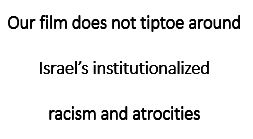
That moment led to more reading, the discovery of Tikkun Magazine, and a short film by Israeli filmmaker, Haim Bresheeth: State of Danger, which I sponsored on public access TV, creating a furor. As Ellen Davidson has written about that period: “The needle on this debate has moved considerably since the 1980s, when just to say the word “Palestinian” was considered inflammatory, even in some left circles.” Norman Finkelstein was among a few leading voices deconstructing Israel’s policies and practices and he was receiving constant threats.
From that day forward, I began wading into activism. My first real contact with Palestinians came in the mid-1990s in Dubai, followed by my first filmed interview in 2003 with Israeli activist Jeff Halper, the founder of ICAHD: Israeli Committee Against House Demolitions.
As one thing led to another, I met a young European director also committed to this issue. In 2008 we produced an hour-long documentary, based on interviews with 16 Israeli Jewish peace activists, which won four awards internationally. Some of these activists represented leadership within the movement and important key organizations: B’tselem, Yesh Din, Breaking the Silence, The Parents’ Circle, Seruviks refusing military service from New Profile, Machsom Watch, Gush Shalom Ta’ayush, ICAHD and the extraordinary Rabbi Jeremy Milgrom.
That film is entitled Voices From Inside, Israelis Speak and from that, came the momentum for the current documentary Jews Step Forward.
The latter was really set in motion by Joel Kovel, whose inspiring book: Overcoming Zionism was a catalyst and whose help was immeasurable. He was an eloquent, modest and self-effacing intellect, hugely respected inside the movement. Tremendous credit goes to my very creative co-producer and editor, Elika Rezaee, who breathed visual life, music, animation, dimension and continual movement into spoken words. Without her, this would still be a script of talking heads. Recognition is also due our archivist Sage Brucia, composer Joe Berry, and Dan Walsh and his Palestine Poster Project of over 8,000 archived images at Columbia University.
Jews Step Forward is a confession by informed Jews who deconstruct Zionism, paired with on-the-ground stills and moving footage, which make their words undeniable.
The American media is saturated with entertainment violence. However, on the subject of Israel, there is a blanket blackout on showing any violence perpetrated by its Jewish citizens or military. Consequently, war crimes can remain conjecture, a ‘he said, she said’ with no visual evidence. Our film moves from the safety of intellectual abstraction to visceral reality, as we don’t visually tiptoe around the institutionalized racism and atrocities discussed.
Jews Step Forward is based upon interviews with 24 American Jewish activists, spanning generations, socioeconomic divides, geographical locales, and extremely varied experiences inside religious practice and observance.
Each of their personal stories led them to a 180-degree turn and a call to action. Some had that epiphany through reading and research, some by first hand experience on the ground. A number of them have written books, taught courses, founded organizations and initiatives, or led direct action organizing and disruptions or protests on this issue, bringing it to the public square. Some approach the issue, along with assisting indigenous Palestinians, through the lens of their profession, be it law, medicine, journalism, religion or academia. All are introducing form and leadership to this growing movement across America today, like pixels shifting to change the larger picture.
There has evolved a kind of Jewish solidarity around Palestinian rights, which binds them the way religion or Zionist loyalty formerly did. Palestine work is a new way of expressing and developing spiritual values, the way fighting segregation or ending apartheid had been in the past. And although in its infancy, there is a new way of worship and observance, purged of the Israel of today and without any reference or allegiance to the Zionist state. This is instead referenced with the prophets, Rabbi Salanter, Musar, and the concept of Tikkun Olam.
Modern Judaism views Mashiach — Messiah — not as a literal savior, but as a metaphor for an age of Messianic enlightenment, with liberal Jewish belief in a world perfected through striving to reach the highest Jewish ideals of justice and compassion. Listen to Rabbi Alissa Wise: “There is no Judaism without that experience of being in exile, right?….Exile itself is a metaphor….One of the dangers of Zionism is that belief, that we’ve reached that place of redemption, of Mashiach….and I see Zionism eclipsing the spiritual and ethical work that is our heritage.” Or, as Dorothy Zellner puts it: “They have hijacked our Jewishness, and they have made it into a place, a country—so our Jewishness became a place.”
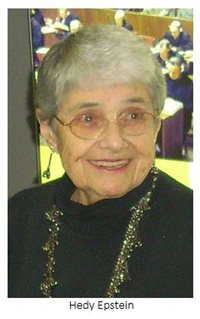
The Interviewees
Following are summary descriptions of some of the activists in Jews Step Forward, who now define their lives in large part by working to change Jewish attitudes, influence Christian congregations, and improve the lives of Palestinians living under brutal military Occupation.
Three interviewees were in their 80s, two being German Holocaust survivors: Hedy Epstein and Silvia Tennenbaum and the third, a noted writer for The Washington Report on Middle East Affairs: Rachelle Marshall. These ladies have all recently died, but inspire a lasting moral legacy with the memory, work, and writing that survives them.
Born Hedwig Wachenheimer on Aug. 15, 1924 in Freiburg, Germany, Hedy Epstein grew up, an only child in Kippenheim. During the Kristallnacht period, her father was arrested, suffered a heart attack during four weeks incarcerated in Dachau, and Hedy, like all other Jewish children, was expelled from school by edict. In 1939, her parents arranged her escape on a Kindertransport to England, while they and almost all her extended family died in Auschwitz.
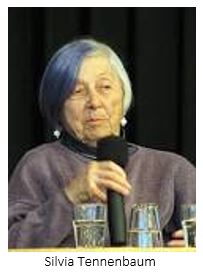
After the War, Hedy returned to Germany, worked at the Nuremberg trials and later emigrated to the U.S., working with displaced refugees in New York and Minneapolis. After marrying and moving to St. Louis, most of her career there was devoted to fair housing and employment discrimination issues in the African American community.
It was during Israel’s 1982 invasion of Lebanon that Hedy had her eureka moment and began active opposition to Israeli actions. She helped organize chapters of the Palestine Solidarity Committee and Jewish Voice for Peace, as well as in 2001 founding a Women in Black group in St. Louis. Nearly 80, Hedy began visiting the West Bank as a volunteer with ISM, the International Solidarity Movement, where she was tear gassed and suffered hearing loss from IDF sound bombs.
At Ben Gurion Airport in 2004, tiny Hedy was accused of being a terrorist and roughly stripped and cavity searched, a violation which viscerally took her back to her childhood responses during the Nazi era. That indelibly engraved her definition of what Israel had become and strengthened her resolve to be a witness to effect change.
Meeting and hearing Hedy’s story was an indescribable experience, as few times in one’s life will anyone meet someone as transcendent as Hedy Epstein. Her 1999 memoir, written in German and published in Germany, is entitled “Erinnern Ist Nicht Genug” (“Remembering Is Not Enough”).
Writer and activist Silvia Tennenbaum was born into a wealthy family in Frankfurt am Main, Germany, in 1928. Anne Frank was her cousin. Her stepfather was a conductor for the Jewish orchestra there during the early Nazi period and subsequently in 1936, helped found the Palestine Orchestra, which became the Israeli Philharmonic. The family sailed to America in 1938, sponsored by Arturo Toscanini of the NBC Symphony.
Growing up in New Rochelle, N.Y. and attending Barnard College, in 1951 she married a young Rabbi attending Columbia, Lloyd Tennenbaum. After a posting in Virginia, the family came to Long Island where Rabbi Tennenbaum took the pulpit at the Huntington Jewish Center. The couple shared leftist political views and were very active in anti-war and social issues.
Silvia’s controversial, semi-autobiographical exposé novel, “Rachel, the Rabbi’s Wife,” was on the N.Y. Times bestseller list. Silvia was active in Women in Black vigils well into her 80s, protesting the Occupation and writing letters to the editor, where she was considered an octogenarian radical. She discussed hearing extremist Rabbi Meir Kahane speak in N.Y. in the ‘70s, when his Kach party was banned in Israel, and his similarities with today’s Israeli Yisrael Beiteinu party, which is even more extreme than Kach during that period. In Silvia’s words: “My God, that experience with Kahane was extremely prescient, given things that are happening in Israel now…..What was the point of giving Israel a state, if this is what was going to happen to it.”
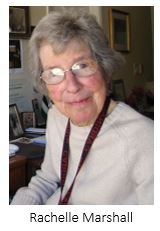
Writer, Rachelle Lubarsky Marshall was born in New York City into an observant immigrant family in 1927. Marrying Hubert Marshall, a Stanford academic, they spent 53 years in that community. Both were active in civil rights, the anti-Vietnam War movement, and worked on housing issues in West Virginia.
Like others of her generation, as a young woman she felt there was “no inconsistency in working for civil rights in America and giving my full support to Israel”. However, it was U.S. involvement in Vietnam that opened up a more objective evaluation of Israel, which she had denied or dismissed earlier. She wrote: “The light began to dawn as I learned the Jewish haven I had welcomed, was established on the land the Palestinians have a right to claim as their own…..the more I read, the greater my sense of betrayal.”
Rachelle’s anger turned to activism and she went on to research and write on Israel in The Progressive, Foreign Policy in Focus, and for 25 years in the Washington Report on Middle East Affairs. Maintaining that all wars were inherently war crimes, she wrote: “I am compelled to speak out against acts of brutality and injustice, no matter who commits them.”
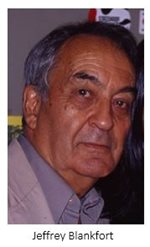
Jeffrey Blankfort was a pioneer in the movement, at a time when almost no Jew dared question Israel in any forum. Jeff was raised as a secular leftist, whose father was a blacklisted Hollywood screenwriter during the Red Scare. After organizing the largest fundraiser in history for the newly declared Jewish state at The Hollywood Bowl in 1948, his family became very disillusioned with Israel and the corruption they saw at the outset. Favoring a bi-national state, they never supported Zionism.
Jeffrey is a photographer, print and broadcast journalist with extensive work on the Middle East, his own radio program, a former editor of the Middle East Labor Bulletin and co-founder of the Labor Committee of the Middle East.
As a member of the first generation of Jewish critics of Israel, Jeffrey was targeted by the ADL. Subsequently, he exposed their spying operations against Americans speaking and writing critically of Israel, winning a lawsuit in 2002 against them. His articles have appeared in CounterPunch, Dissident Voice, Mondoweiss, Pulse Media, Left Curve, TIKKUN, the Encyclopedia of the Israeli-Palestinian Conflict and other publications.
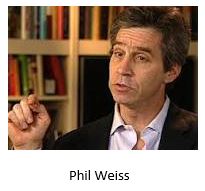
Phil Weiss grew up in Boston, where his father was an academic at Harvard, which he attended too. He has written for New York Magazine, Harper’s, Esquire, and The New York Observer.
A visit to Hebron in 2006 marked his turning point, compelling him to write about Israel. He is an anti-Zionist journalist who , in 2007, after pushback from the newspaper where he was a writer, created with Adam Horovitz, the daily independent blog Mondoweiss, which they describe as “a news website devoted to covering American foreign policy in the Middle East, chiefly from a progressive Jewish perspective.” [The newspaper Phil worked for was The New York Observer, and the pushback came from its young new owner Jared Kushner.]
It is difficult to overestimate the influence of Mondoweiss, which is probably the most widely followed English language blog and website on this topic existing today, a daily ‘go to’ read for activists internationally on this issue, as well as a platform for their voices. As Phil puts it: “We are editors and we guide the stream, but there is a large stream of people who are actively questioning these issues and who want to join us: young Jews, young Muslims, young Palestinians, young Americans.”
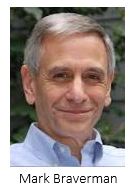
Psychologist and Writer: Mark Braverman, grew up in Philadelphia, attended Jewish Day Schools, was a leader in Zionist youth groups and is a fifth generation descendant of a Jerusalem Lubavicher. With many relatives in Israel, he originally revered it as the only safe haven for Jews. However, in stages he began to enlarge his perspective, meet Palestinians, and deeply educate himself.
Today, he works full time on this issue speaking with Christian groups to empower them to be informed and forceful in demanding accountability from Israel. He is a leader of Kairos USA, a pro-Palestinian group for American Christians. He also authored: Fatal Embrace: Christians, Jews and the Search for Peace in the Holy Land and A Wall in Jerusalem: Hope, Healing and the Struggle for Justice in Israel and Palestine.
Mark speaks decisively against Israeli exceptionalism and ‘chosenness’ as tribal anachronisms impeding equality and justice; as he puts it: “The role of occupier is leading Israel down a road of political disaster, and the Jewish people down a road of spiritual peril…..the greatest crisis in Jewish history since the Babylonian exile…Our task is to rescue Judaism from an ideology that has hijacked the faith, continues to fuel global conflict, and has produced one of the most systematic and longstanding violations of human rights in the world today…..I am a proud Jew. I love Israel. And I am heartsick about her.”
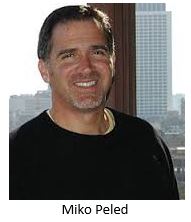
Miko Peled could safely be termed Zionist royalty. His maternal grandfather, Avraham Katznelson, was a signatory to the 1948 Israeli Declaration of Independence and a member of the Provisional Council of State, which comprised the leaders of the state-in-making. Mr. Katznelson was a Labor party politician, diplomat, director of the Health Department of the Zionist Executive and a member of the Va’ad Leumi, as well as the central committee of Hashomer Hatzair and Mapai. Miko’s father was Matti Peled, who fought in the 1948 war, rose to be a Major General in the 1967 War and became an architect of the modern IDF, where Miko himself served in the Special Forces. When Miko’s 13-year-old niece was killed in a suicide bombing, it began his path to transformation, after her parents joined Bereaved Families.
Beginning with dialogue groups in San Diego, where he felt more at home with Palestinians offering tabbouleh and hospitality, than liberal American Jews, he abandoned the ‘2 state solution’ and began advocating for full democratic rights for all in a single secular state. In our film he states openly: “The Zionist state is a bad thing, it was that way from the beginning.” He has written 2 important books: The General’s Son: Journey of an Israeli in Palestine and Injustice: The Story of the Holy Land Foundation Five. He is now married to a Palestinian and is a dynamic speaker, lecturing internationally on this issue.
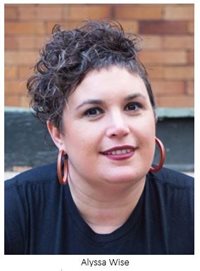
Rabbi Alissa Wise (family name originally Schnautski) grew up in Cincinnati, Ohio, where her grandfather was involved with kosher food distribution. She is part of the Nahalat Shiva through her Rivlin forebears, one of the original seven families from Lithuania to settle outside the wall of Jerusalem’s old city in 1809.
Raised with that pedigree in a large patriarchal, modern but Orthodox extended family, observing Shabbat, Alissa attended both Jewish day school and Zionist summer camp. She said while growing up: “Zionism was like a cornerstone of my Jewish identity….really a centerpiece.” Visiting Israel and the death camps in Europe, like many Jewish teens, cemented her loyalty and desire to attend university in Israel.
Her Junior year abroad at Hebrew University led to her epiphany. From the first day on campus, with a Nakba demonstration, she began to deconstruct both her socialization and Zionism itself in what she describes as “a very painful year, realizing I had been lied to.”
Since graduating from the Reconstructionist Rabbinical College in Philadelphia in 2009, she has been an activist for justice in Israel/Palestine, first with Jews Against the Occupation in N.Y.C., on the West Bank with the International Women’s Peace Service, and as the founding co-chair of the JVP Rabbinical Council.
Rabbi Wise is now a spiritual leader within the movement, as the Director of Campaigns at Jewish Voice for Peace and serving as the National Coordinator for the We Divest Campaign.
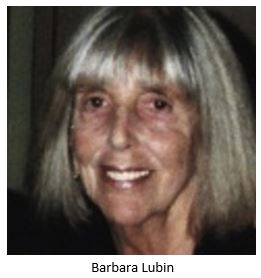
Barbara Lubin is a very unique activist. Growing up in a staunchly Zionist home, the family attended synagogue every Friday night and she remembers the joy when Israel became a state. Her mother was president of the local ORT, a Jewish service organization, and her father was a lawyer defending Jews during the Red Scare. When she was 16, he died. With that shock, she dropped out of high school, became a beatnik in the circle of Alan Ginsberg and Ferlinghetti, and worked actively against the Vietnam War. Raising four children, she continued activism across various issues.
It was not until a visit to the West Bank during the First Intifada, where she was tear gassed inside a Palestinian home in 1988, that her life completely changed. With Howard Levine, she founded The Middle East Children’s Alliance, MECA immediately thereafter. Having witnessed the grave injustice, poverty and violence of the Israeli Occupation paid for with U.S. tax dollars, Barbara and Howard decided to speak out about what was happening to Palestinian children.
The initiatives, projects, organizing and outreach of MECA would fill this publication. Possibly in part because she did not follow a formal education, Barbara thinks outside the box and is consistently unafraid of creative solutions. With a special needs child herself, Barbara responds like a mother for all Arab children. She steps out of Judaism and into Ahl-i-Kitab — People of the Book — and an Arab consciousness.
MECA has done projects in Iraq, donating food, medicine, school supplies for children and raising consciousness all over America of the deprivation of children there.
In Palestine, inside the Dheisheh Refugee Camp, MECA has supported a women’s embroidery collective, computer center, and many educational workshops on health and nutrition in the camp.
In 1999, MECA brought The IBDA dance troupe of 20 children and their leaders to the United States, raising funds to build a four-story guest house with a restaurant, computer center, multipurpose hall, as well as a five-story computer center, multipurpose hall, as well as a five-story
women’s building, which houses a kindergarten, children’s library, mental health clinic and other projects for women.
In 2002, Israeli tanks and helicopters invaded Dheisheh Camp and soldiers took over one of the buildings. They used the roof as a sniper’s nest and critically wounded four small children. Then they destroyed most of what was inside that center. MECA, along with other partners, rebuilt it.
MECA gives hundreds of scholarships for university education inside Palestine, as well as some for colleges in the U.S.
In Gaza, where malnutrition is widespread and many families live on one meal a day, MECA has provided tons of powdered milk, fortified children’s cereal, an ambulance, wheelchairs, and surgical instrument—as well as art and school supplies and has partnered to buy and distribute food, blankets, and plastic sheets to cover windows in winter, broken by IDF bombing.
In September 2009, MECA launched what I think is their most brilliant and important idea: the Maia Project, a long-term initiative to decentralize water purification in Gaza. Its purpose is to address and circumvent the repeated IDF policy of bombing the water treatment plants, intended by Israel to increase infant mortality and spread disease inside the captive population. MECA provided funds for clean drinking water systems in kindergartens, elementary and middle schools in Gaza, where children have filtered drinking water at school and fill containers daily to take home for family use at night. This empowers children to participate in family survival.
Since 1988, MECA has brought the reality of the suffering of Palestinian children to thousands of Americans, through public events and the media, organizing dozens of demonstrations and actions to protest Israeli bombing, occupation and sanctions against the children of Palestine. “I’m really glad that my children and my grandchildren, that every one of them, they’re in touch with being Jewish, but they’re all anti-Zionist.”
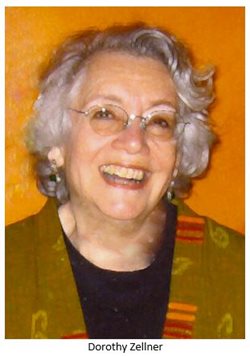
Dorothy Miller Zellner was born in 1938 in Manhattan, the child of immigrant Jewish leftists, who supported racial equality and social justice. After graduating from Queens College and during the summer of 1960, she trained with the Congress of Racial Equality in non-violent resistance. In 1961, she worked with the Southern Regional Council in Atlanta and subsequently the Student Nonviolent Coordinating Committee (SNCC), run exclusively by young people from 1962 to 1967, and worked with Julian Bond to help build a national network. She spent Freedom Summer 1964, in Greenwood, Mississippi.
After SNCC, Zellner and her husband Bob moved to New Orleans to join the Southern Conference Educational Fund. Having returned to New York after 22 years living in the South, a trip to Israel in 2002 galvanized her to devote herself to ending the Occupation, the same way she had worked for equal rights in the Civil Rights movement in the South. She is a founding member of Jews Say NO and has toured with Open Hillel, making a mark on the next generation of Jewish college students.
In her own works: “I do not think that states that privilege one group over another are viable states…. I’m a Jewish activist organizing against the Israeli occupation of Palestine…the attacks on us are going to be worse. This is like a cornered animal: its fangs are out now….. Remember, it’s not because of our failure that we’re being attacked, but because of our success….. You can see this happening already….. And as far as the established Jewish organizations are concerned, this is the beginning of the end of the hand on our throats preventing us from talking or thinking…. I’ve been in two big struggles in my life. The Civil Rights Movement, and this…… And relying on Jewish tradition, I felt that I could not stand idly by. ”
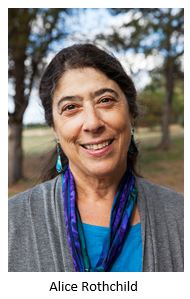
Alice Rothchild grew up in Sharon, MA, attended Bryn Mawr, became an obstetrician-gynecologist involved in healthcare reform and women’s issues, and was a member of the Harvard Medical School faculty. With Orthodox family roots in Brooklyn and having received a Jewish education, Alice took a more secular direction and became very active with the Boston Workman’s Circle in Brookline.
Visiting Israel as a teen charmed her, but witnessing Israel/Palestine as an adult, she felt called to activism, where she has been a leader across the last 20 years: doing pro bono medical work for women in Palestine, authoring 3 books: Broken Promises, Broken Dreams; On the Brink: Israel and Palestine on the Eve of the 2014 Gaza Invasion; and Condition Critical: Life and Death in Israel/Palestine, and directing a documentary on the Voices Across the Divide.
Now retired from medicine, she writes and travels to present screenings and speak on the Occupation across the country. “When you don’t see people as human, you do really awful things to them…And then, for the same Jews to be inflicting… massive demonization and destruction on other people is horrible, is just devastating. We really should know better.”
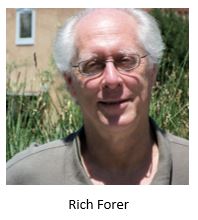
Rich Forer was born in New Jersey into a family of lawyers, raised in a Reform congregation, with grandparents who were immigrants from Russia and Poland. He grew up acutely aware of the Holocaust and anti-Semitism, feeling fearful and defensive as a Jew, particularly regarding Israel. His identical twin brother, after college, went to Israel and during a kibbutz year became an ultra-Orthodox Lubavitcher. Rich like others believed that Israel had been a land without a people, that Arabs had fabricated the existence of the Palestinians, and that Jews there were superior to the Arabs and only benevolent. He joined AIPAC, fought with anyone criticizing Israel, attributing all criticism to anti-Semitism, which he felt was everywhere.
In 2006, during Israel’s second invasion into Lebanon, he supported the bombing as perfectly appropriate, rationalizing anything Israel did. This came to a crescendo when he read Finkelstein’s Beyond Chutzpah.
From shock to anger to embarrassment to shame to sorrow for the Palestinians in one sitting, this culminated in a kind of spiritual experience for Rich. His epiphany freed him from Zionism, like a Zen transformation.
After that day, Rich authored a book, lectures nationally, writes prolifically, travels to the West Bank, and pursues activism and the truth with compassion on this issue.
His articles on the conflict include: “Lack of Self-Reflection Leads to Moral Disintegration”, “Perpetuating Distrust and Conflict: Israel’s Use of Character Assassination,” “The Root Cause of Delusion, Prejudice, Suffering and Conflict,” and “Fighting Slander and Oppression. “
The next group of activists, also often writing, are direct action, grassroots organizers working to bring visibility to the Occupation and reframe the issue in order to counter Israel’s narrative.
They bring numbers and outrage to force recognition of the problem, but as Rae Abileah states: “We have a lot of creative tactics, a lot of humor in our actions.” These include street theater, flash mobs, disruption of speakers including Prime Minister Netanyahu, demonstrations, visits to Congressmen, billboard and boycott campaigns, marches, rallies, and attempts to break the Gaza siege by sea.
Although local and ‘in the moment,’ they build both solidarity and awareness, particularly among young people, using social media to magnify and document their ‘moment.’
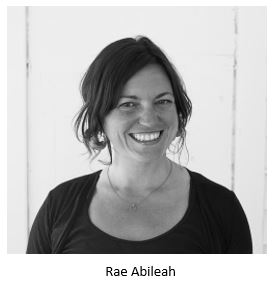
Rae Abileah, whose father is Israeli, grew up in suburban California in a secular family, sought out religion at 12 and continues to be observant today, as an ordained Kohenet.
While initially in love with Israel as a teen on her Young Judeah Hadassah trip, after visiting the West Bank with her ordained Israeli partner, they both had an epiphany, which turned them to work for Palestinian rights.
She studied human rights at Barnard College, has written for Mondoweiss, AlterNet, Common Dreams, Tikkun, and is a direct action activist, disrupter and organizer. She served as co-director for CodePink Women for Peace for eight years and is a founding member of Young Jewish and Proud, the youth wing of Jewish Voice for Peace. Her work in the Jewish community includes past projects with American Jewish World Service, Wilderness Torah, B’nai Brith Youth Organization, Hillel, and synagogues.
In Rae’s own words: “It’s an unlearning of a brainwashing that I think needs to happen around this issue….We really got to see some of the harshest forms of Israeli cruelty…..and felt so much more empathy being there in person, so for me that’s the crystallizing experience”.
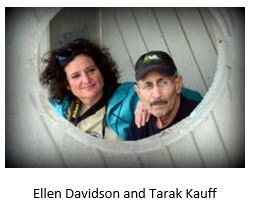
Tarak Kauff and Ellen Davidson:
Tarak is a longtime NY antiwar and social justice activist from the Vietnam War onward, after serving as a paratrooper in the U.S. Army from 1959 to 1962. He is a member of Veterans for Peace, a founder and editor of the bimonthly Woodstock International and quarterly War Crimes Times, both Progressive papers. Veterans for Peace was awarded the 2016 Peace Prize by The U.S. Peace Memorial Foundation “in recognition of heroic efforts to expose the causes and costs of war and to prevent and end armed conflict.”
Ellen is an activist reporter and photographer, who began her work at the New York Guardian and has written for Mondoweiss, Ma’an News, and the NY Indypendent. As the Vietnam War radicalized Tarak, the anti-Apartheid Movement did Ellen. Moving from her childhood perception of Israel, as a victim beset by terrorists and threatened by attacking armies, she writes: “I realized that Israel was on the wrong side of all the struggles for freedom and national liberation I supported, that it backed dictatorships in Guatemala, Chile, Brazil and elsewhere. The more I learned about Israel, the more I realized that what I had been taught growing up was a lie.”
Tarak and Ellen took part in the 2009-10 Gaza Freedom March in Cairo and were part of a nine-person Veterans For Peace Team that went to the West Bank and the Negev in 2017 to make these three demands:
An end to the Occupation.
An end to the system of apartheid, referred to by Desmond Tutu as worse even than South Africa’s.
An end to the four billion dollar U.S. military aid to Israel.
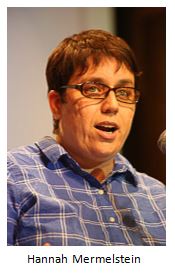
Hannah Mermelstein grew up outside of Philadelphia in a Jewish suburb and loved Hebrew, Hebrew school and synagogue, but more than anything else, the sense of Jewish community. Attending Zionist summer camp, taking a gap year at a kibbutz in Israel and attending Goucher College which had no Arab or Muslim students, Hannah states: “So, I still, throughout my life, into college had never heard a non-Zionist narrative, never heard an Arab narrative.”
It was while living in Nicaragua that her perspective on Israel began to change. Senior year in college and a trip with International Women’s Peace Service to the West Bank, followed by spending time in Dheisheh refugee camp, prompted Hannah to become anti-Zionist.
In 2005, Hannah co-founded Birthright Unplugged, in response to Birthright Israel, which leads free 10-day Zionist trips, intended to indoctrinate and bind Jewish youth to Israel. Birthright Unplugged trips introduce youth to the Palestinian narrative, visiting Palestinian cities, villages, and refugee camps in the West Bank and encouraging engagement and activism.
In Hannah’s own words: “I haven’t been to services in years. Most synagogues have the American flag and the Israeli flag hanging in their sanctuary; I don’t feel comfortable in synagogues now and so that part of Jewish community and identity and consensus I’m not part of anymore. What inspires and sustains me now, is Palestinian people, the work and relationships with Palestinians.”
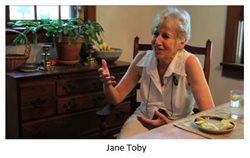
Jane Toby, a New York academic living in Verona in the 1990s, first learned about Women in Black. The group was founded in Israel in 1988 by Jewish and Palestinian women, who stood in silent vigils wearing black, against the Occupation and for a just peace. During the Balkan war, women of varied factions there also joined ranks, to hold vigils of solidarity against the atrocities and division in their own country. Jane brought Women in Black to America to protest Israel’s Occupation and other wars. She wrote: “Our future rests on ethical behavior and personal responsibility, not on nationalistic orientation.”
The Choice
In conclusion: Judaism is not a template, despite the success over several generations of utilizing Israel as the ‘tie that binds’ disparate American Jews together into a loyal consensus.
Dissolving the shtetl created a liberation moving outward in all directions. Ironically, the ‘in gathering’ inherent in Zionism’s creation of its religion-based state is seen by some as a new ghetto of consciousness, beholden to militarism, racism and violence to sustain it.
“Zionism” as Mark Braverman says “has served to keep Jews trapped in an isolationist, exclusivist past…… yoked to a theology of territoriality and tribal privilege.”
Or, as Miko Peled puts it: “Israel is faced with two options: Continue to exist as a Jewish state while controlling the Palestinians through military force and racist laws, or undertake a deep transformation into a real democracy where Israelis and Palestinians live as equals in a shared state, their shared homeland. For Israelis and Palestinians alike, the latter path promises a bright future.”
There is no question that Zionism has tried to overlay itself across Judaism. Perhaps that is changing, as we are seeing diaspora Jews across every divide free themselves and step away. Some with indifference, others with open rejection. But this is happening in America, as the move for justice and equal rights for Palestinians is increasingly led by Jewish activists.
As Dorothy Zellner told Mondoweiss: “Look at the large number of Jews in the anti-Occupation movement. These are people who have been told since babyhood that Israel is everything…. And the miracle of this is that so many people who were brought up like that began to see with their own eyes. Who would have thought that Jewish Voice for Peace would have 140,000 people on their list now.”
Jews Step Forward is dedicated in memory of Hedy Epstein, whose life exemplified Jewish humanism and Ali Lallo, whose journey from Dheisheh refugee camp to Al Khaleej, has inspired all my films.
A word about Ali. He was born in Dheisheh refugee camp, worked hard to learn English, ultimately becoming a journalist. I met him in Dubai at a lecture given by a British Muslim discussing Palestine. I had raised my hand and mentioned Gideon Levy, Amira Hass and Tanya Reinhart, all writing inside Israel. Ali approached me afterward, introduced himself and that began the friendship between our two families. He was working for Al Khaleej in Shariah, the largest publishing house on the Gulf at the time, where among his duties, he chose the English language books to translate into Arabic. I remember he zeroed in on Norman Finkelstein’s “The Holocaust Industry.” It was through Ali that I met the Consul General representing Palestine and members of that Consulate in Dubai, who shared footage and photographs for my first film. Sadly Ali passed away in 2013.
